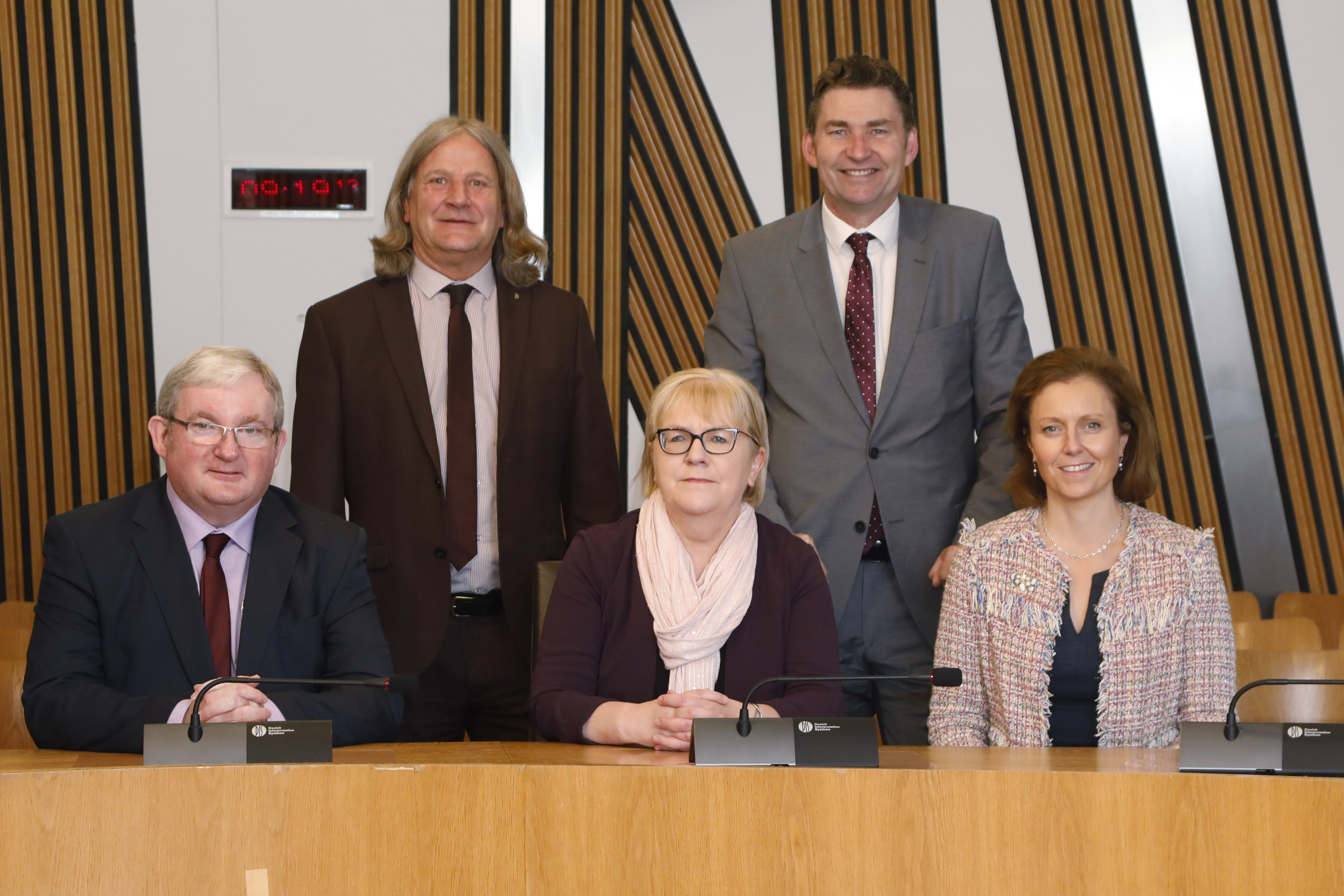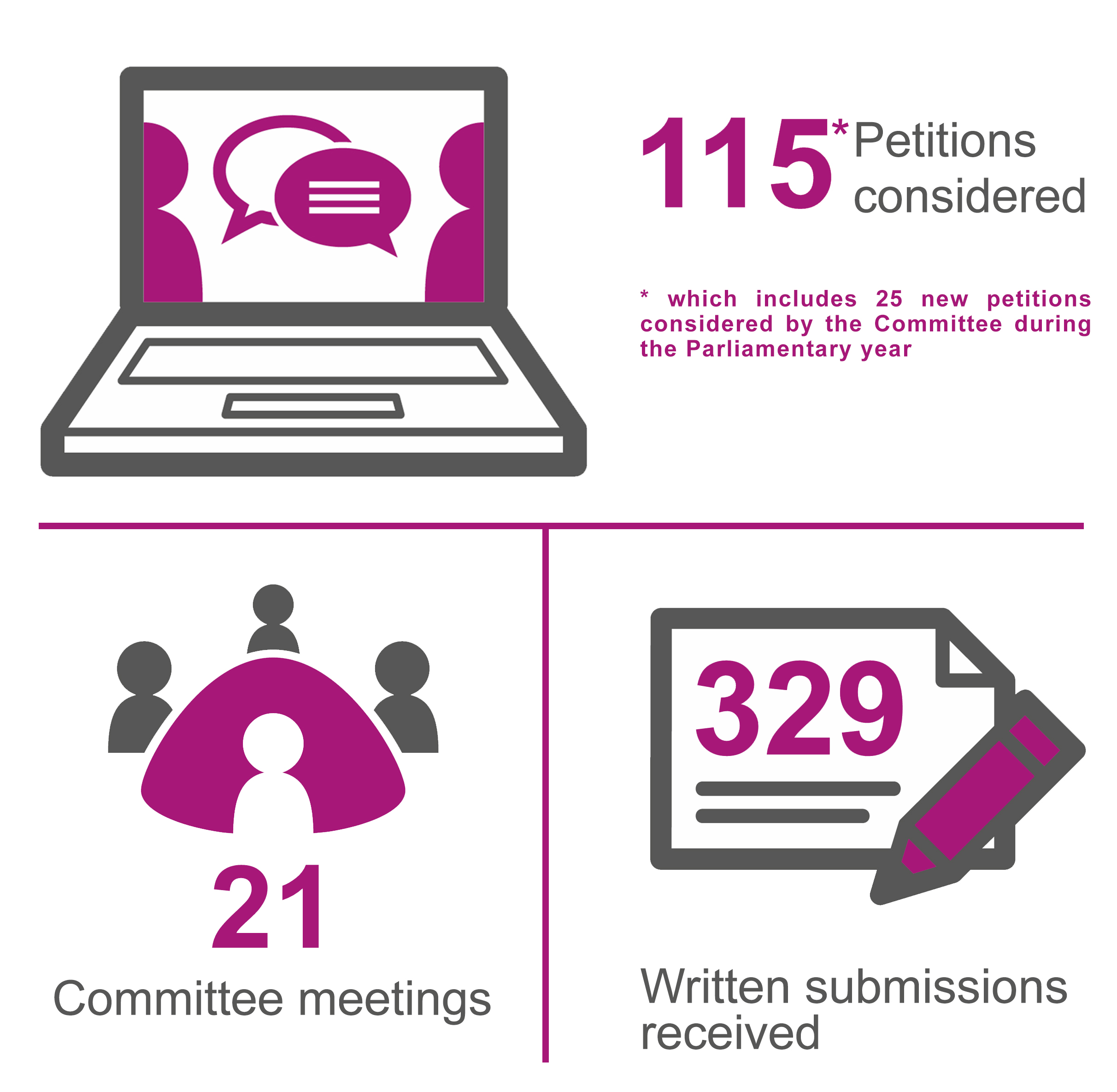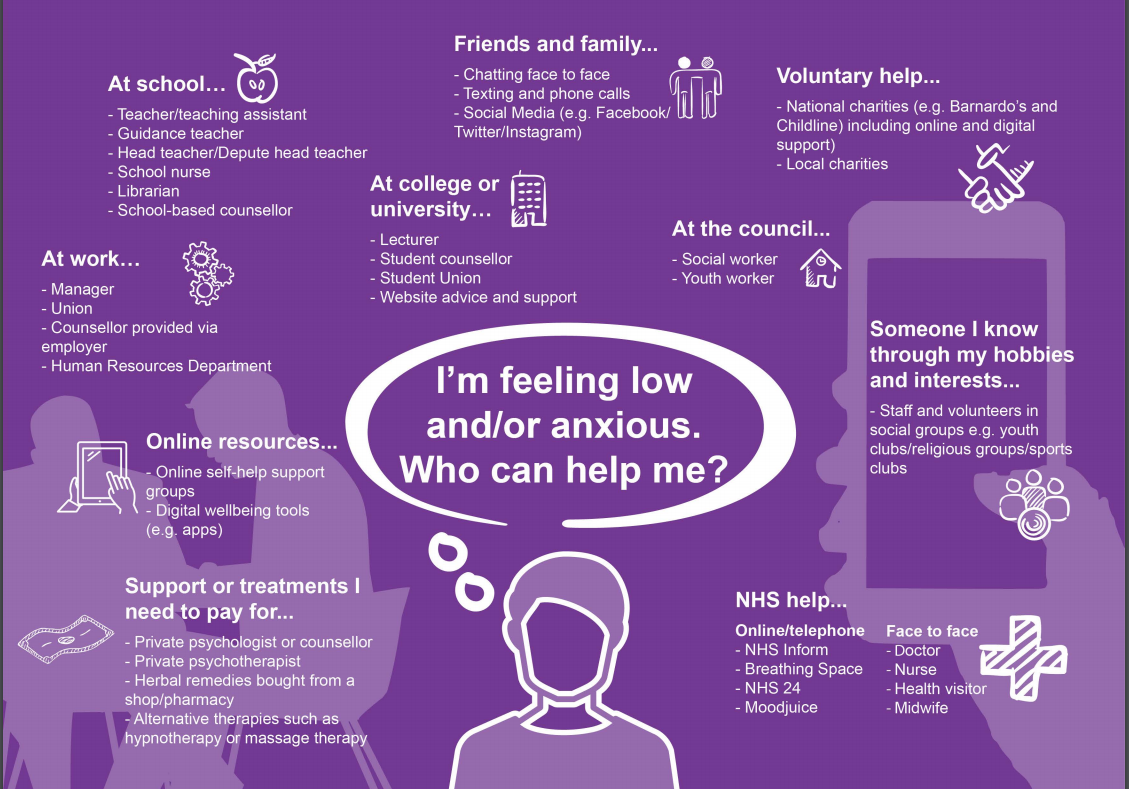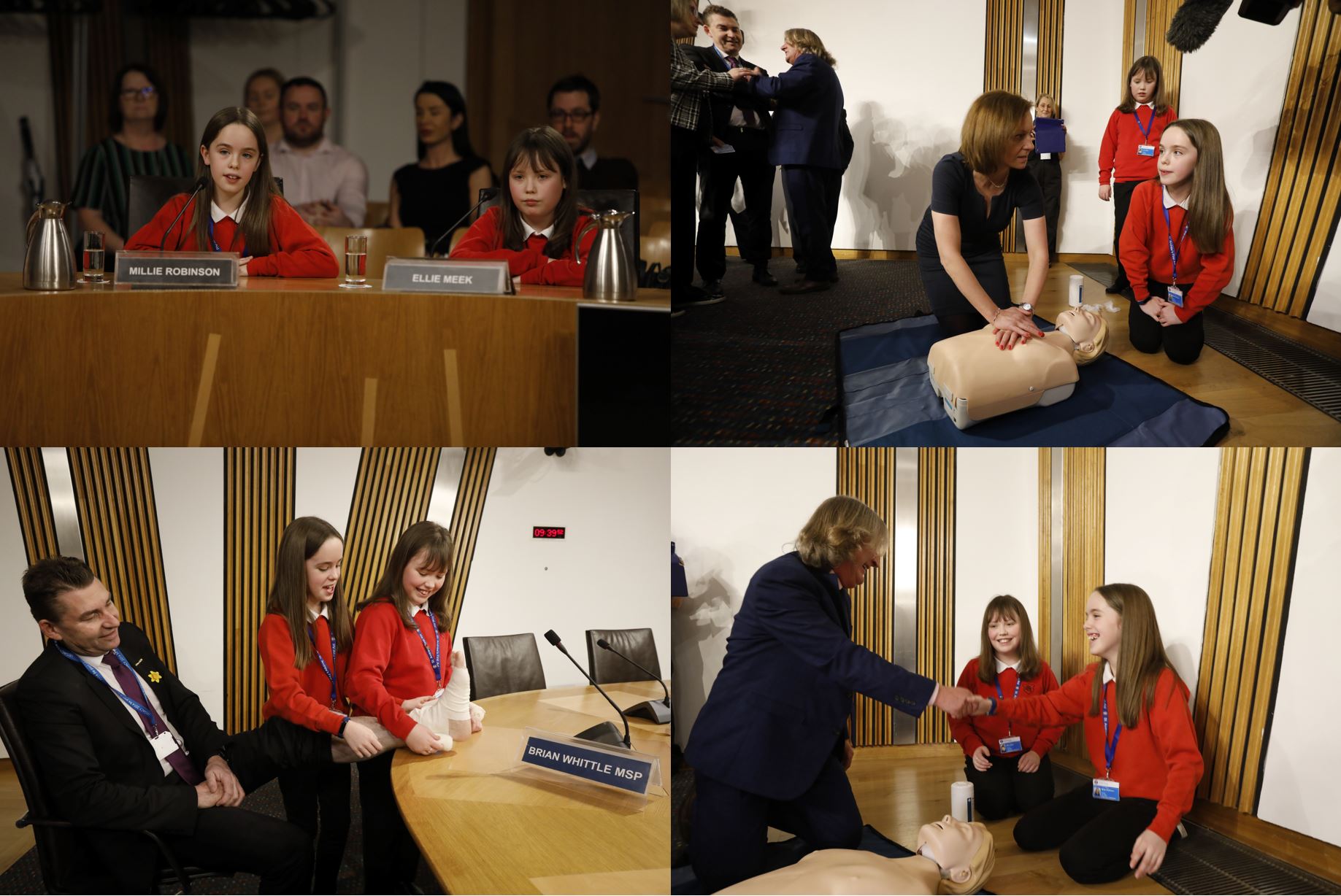Public Petitions Committee
Annual Report 2018-19
Introduction

This report covers the work of the Public Petitions Committee during the Parliamentary year from 12 May 2018 to 11 May 2019.
The report covers the previous membership of the Committee during the reporting year:
Michelle Ballantyne MSP (29 June 2017 to 17 June 2018)
Rona Mackay MSP (16 June 2016 to 6 September 2018)
The work of the Public Petitions Committee
The Public Petitions Committee considered 115 petitions over the course of 21 meetings during the Parliamentary year from 12 May 2018 to 11 May 2019. Twenty five new petitions were considered during this time period.
In keeping with the Scottish Parliament's principles of openness and transparency, the majority of the Committee's work is considered in public. During the Parliamentary year, only one meeting was held entirely in private. On eight occasions, the Committee held part of its meeting in private to consider items of business including draft reports, the approach to an inquiry and the Committee's work programme.
The majority of the information gathered by the Committee is through written evidence from petitioners and members of the public with an interest in the petition as well as the Scottish Government and other relevant organisations. In total the Committee received 329 written submissions during the Parliamentary year.
The Committee has taken oral evidence from witnesses on 25 petitions during the Parliamentary year, hearing directly from petitioners on just over half (13) of these petitions.

Non-Committee MSPs continue to take a keen interest in the work of the Public Petitions Committee. A total of 14 non-Committee MSPs attended a Committee meeting in connection with 14 separate petitions, with some members making contributions in multiple petitions.
The Committee has taken evidence from Scottish Government Ministers on eight petitions including the Cabinet Secretary for Health and Sport and the Minister for Mental Health.
During the Parliamentary year, the Committee published two reports—
4 June 2018: PE1603 on Ensuring greater scrutiny, guidance and consultation on armed forces visits to schools in Scotland; and
21 August 2018: PE1517 on Polypropylene Mesh Medical Devices
In its consideration of petitions, the Committee seeks to avoid duplicating work that is already being considered by the Scottish Parliament. The Committee therefore only refers petitions to another committee where the issue fits with the existing work programme of that committee. During the Parliamentary year, the Committee referred a petition to another committee on seven occasions. For example—
8 November 2018: PE1616 calling on the Scottish Parliament to urge the Scottish Government to make it an offence to park in front of a dropped kerb was referred to the Rural Economy and Connectivity Committee in its consideration of the Transport (Scotland) Bill, at Stage 1.
22 November 2018: PE1694 calling on the Scottish Parliament to urge the Scottish Government to change the law to ensure that musical instrument tuition is available as of right to all children attending state schools in Scotland who wish it, free of charge was referred to the Education and Skills Committee for consideration in connection with its ongoing inquiry into music tuition in schools.
The Committee also takes the opportunity to bring petitions forward for debate by the Parliament where it considers it appropriate to do so. For example, following a report on petition PE1463: Effective thyroid and adrenal testing, diagnosis and treatment, published on 29 March 2018, the Committee held a debate in the Chamber on this petition on 4 December 2018.
Inquiry into mental health support for young people in Scotland
Following consideration of public petition PE1627 on consent for mental health treatment for people under 18 years of age, which included taking oral evidence from the petitioner and gathering a wide range of written evidence, the Committee agreed to hold an inquiry into how young people access mental health services and treatments in Scotland.
The focus of the inquiry aims to understand and suggest improvements on how young people feeling low and/or anxious can get the advice and support they need, particularly for the first time.
In recognition of the Commission on Parliamentary Reform’s recommendation that Chamber time should be set aside to allow committees to announce the launch of significant inquiries, the Committee announced the launch of its inquiry on 6 November 2018 using this new procedure. The inquiry was formally launched the following day.
As part of the inquiry, the Committee developed a diagram mapping the different ways a young person might access the support they need to prompt views and ideas from young people, parents and carers and relevant stakeholder organisations. The diagram was developed to assist people in providing their views in relation to the inquiry.

The Committee is keen to use different methods to gather views and took the opportunity to use the digital engagement tool “Dialogue” as part of its inquiry work. The tool enabled people to engage with the inquiry in a more informal and if they wanted, anonymous way, by allowing them to share their experiences and views of mental health support services for young people and to discuss with others how these services could be improved.
Three separate online discussions for young people, parents and carers, and professionals were set up leading to a total of 72 contributions, with 45 of these contributions (63%) of those coming from young people.
Two outreach events were held in Edinburgh in November 2018 and January 2019 in connection with the inquiry. The events mirrored the online discussions and encouraged face to face conversations between young people; parents; teachers; guidance teachers; youth workers; college staff; and child and adolescent mental health service professionals.
Oral evidence, fact finding visits and external meetings are expected to take place in Autumn 2019 as the Committee continues its work in relation to the inquiry.
Equalities
The Committee has regard to ensuring that equal opportunities are observed throughout its work. For example, in relation to the diversity of witnesses the Committee engages with in its consideration of petitions.
In total, the Committee has taken evidence from 53 witnesses during the Parliamentary year. This comprises of 32 female witnesses (60%) and 21 male witnesses (40%)i.
As well as engaging with young people through its inquiry on mental health support for young people in Scotland, the Committee has engaged positively with young people during the Parliamentary year in relation to other petitions. For example, on 20 December 2018, the Committee took evidence from a Member of the Scottish Youth Parliament (SYP) on petition PE1713 on Ban the use of 'Mosquito Devices' in Scotland raised by the SYP.
On 7 March 2019, the Committee took evidence from young people in connection with PE1711 on First Aid Training for All Primary School Children in Scotland. Along with representatives from St Andrew’s First Aid, the Committee heard evidence from two primary school children and a college student. Prior to the evidence session, the Committee met informally with representatives, the young people and their families and took part in a demonstration carried out by the young people.
Scottish Parliament
What petitions have achieved
The Committee values the role that petitions play in raising awareness of issues that may not otherwise reach the attention of members of the Scottish Parliament. Every admissible petition is considered by the Committee which is a positive outcome in terms of awareness-raising.
The Committee recognises that it is often difficult to directly correlate specific achievements with the petitions process or indeed a specific petition. However, the Committee considers that the following petitions provide some examples of raising awareness and/or delivering a positive change in relation to a particular issue during the Parliamentary year—
PE1697: Child funeral fund
On 28 June 2018, the petitioner agreed to close their petition as the Scottish Government announced that it intended to remove all local authority charges for burials and cremations for those under 18.
PE1517: Polypropylene Mesh Medical Devices
On 21 August 2018, the Committee published its report in connection with this petition calling on the Scottish Government to halt the use of mesh procedures in Scotland, until there was confidence in the findings of the Independent Review set up to examine the controversial procedure.
On 12 September 2018, the Scottish Government instructed health boards immediately to halt the use of transvaginal mesh altogether in cases of both pelvic organ prolapse and stress urinary incontinence, pending the implementation of a new restricted use protocol.
PE1702: Counselling provision in all Schools
On 13 September 2018, the petitioner agreed to close their petition as the Scottish Government's 2018-19 programme for government included a range of new measures to help children and young people to access school counselling services.
PE1694: Free Instrumental Music Services
On 22 November 2018, the Committee agreed to refer the petition to the Education and Skills Committee for consideration within its ongoing inquiry into music tuition in schools.
The petition was one of the catalysts for the Committee’s inquiry into music tuition in schools, which concluded by reporting that, in principle, music tuition should be provided free of charge in every local authority. The Committee brought its report to a Chamber debate on 30 April 2019.
